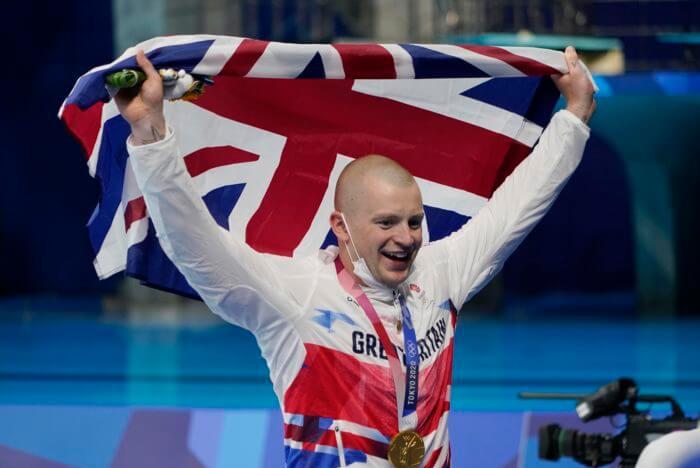
15 minute read
AFTER A YEARLONG DELAY, THE EXTRAORDINARY TOKYO GAMES DELIVERED!
>> Caeleb Dressel
BY JOHN LOHN
Advertisement
It was all supposed to go down last summer, Tokyo the centerpiece of the sporting world. Champions crowned. Iconic performances recorded. Moments of redemption. Upsets. Tears of elation. Tears of heartache. There would be a little bit of everything, and something for all.
Of course, the original plan was shredded. The COVID-19 pandemic, in all its tragic fury, changed the world. Amid the loss of lives and shifting daily environments, the 32nd edition of the Olympic Games was postponed, and while that decision paled in comparison to the life-altering effects of the Coronavirus, athletes saw their dreams put on hold.
If the yearlong delay felt like an eternity – to competitors, fans and media – what transpired in Tokyo proved worth the wait once the Games were held in the Japanese capital. Everything that was initially anticipated was produced, another Olympiad supplying what is – typically – quadrennially desired: The emotions, surprises, goal fulfilments and more.
Let’s take a look, and appreciate, what the Tokyo Games delivered.
JOB DONE
As hyped as any Olympian in Tokyo, Caeleb Dressel couldn’t avoid the comparisons. Due to his vast potential for an epic medal haul, Dressel was linked to United States icons Michael Phelps, Mark Spitz and Matt Biondi. All along, Dressel emphasized that he just wanted to do his thing – and be recognized for his ability.
Shouldn’t be a problem any longer.
As the United States topped the medals count in Tokyo, with 30 pieces of hardware and 11 gold medals, Dressel was nothing short of phenomenal. The 24-year-old from Florida collected five gold medals, three of them solo, set a world record and deftly managed the immense pressure that was placed on his shoulders even before the COVID delay.
Coming off a pair of World Championships (2017 & 2019) in which he starred for the Red, White and Blue, Dressel affirmed his status as the sport’s leading face at his second Games. He won individual gold medals in the 50 freestyle, 100 freestyle and 100 butterfly, and led Team USA to gold in the 400 freestyle relay and 400 medley relay. The fly and medley relay golds arrived in world-record time.
Dressel had to negotiate a gauntlet of challenges, from the United States topping a stout field in the 400 freestyle relay to beating a stacked British squad in the 400 medley relay, a world record of 3:26.78 getting the job done for Ryan Murphy, Michael Andrew, Dressel and Zach Apple. In between those relays, Dressel turned back Australian rival Kyle Chalmers in the 100 freestyle, fended off Hungarian threat Kristof Milak in the 100 butterfly (49.45 to 48.68) and waltzed to gold in the 50 freestyle.
“I tried to convince myself that Worlds was the same, and it’s the same competition, but it’s a lot different here,” Dressel said. “It’s a different kind of pressure, and I’m aware of that now and I can stop lying to myself. It means something different. It only happens every four years for a reason, and it’s 20-something seconds or 40-something seconds. You have to be so perfect in that moment, especially if you have another year, a five-year buildup or a 24-year buildup, whatever you want to call it. There’s so much pressure on one moment. Your whole life boils down to one moment that can take 20 or 40 seconds. How crazy is that?”

>> Katie Ledecky
Katie Ledecky has a firm handle on the expectations that come along with the Olympic Games. A champion as a 15-year-old in 2012, she won three individual crowns in 2016. Her third trip to the Games represented yet another type of appearance. This time, Ledecky was not as dominant, but her resilience shined through.
Edged by Aussie Ariarne Titmus in her first final, the 400 freestyle, Ledecky was then fifth in the 200 free, an event in which she was the defending champion. But Ledecky flashed her distance greatness in her other two individual events, winning gold in the inaugural 1500 freestyle for women, and then capturing a third straight gold in the 800 freestyle. The trifecta enabled Ledecky to join Aussie Dawn Fraser (100 freestyle), Hungarian Krisztina Egerszegi (200 backstroke) and Phelps (100 butterfly; 200 individual medley) as swimmers to three-peat.



“I think I saw a statistic two years ago that said no one’s ever three-peated in that event, and that’s been in the back of my mind,” Ledecky said. “You’re like, ‘Huh, I wonder if there’s a reason why no one has ever three-peated.’ It’s tough. It’s tough to win one gold and to do it three times in a row in that event is really amazing.”



With Dressel and Ledecky as the lynchpins, the United States had no difficulty finishing ahead of Australia in the medals count. Going to work without Phelps for the first time since the 1996 Games, this squad had a chance to build its own identity. It was a young team, which suggests continued excellence in the future. But in the present, there is uncertainty how youth and inexperience will react. Ultimately, this team upheld tradition. the longest pool event since 1984. Both wins were perfectly calculated, Finke hanging with the leaders until he could unleash his unmatched finishing power. And when no one could counter, Finke lived golden moments.
There was an upset gold medal from 17-year-old Alaskan Lydia Jacoby, who ascended the throne of the 100 breaststroke
The Original SaferSwimmer® Since 2010
- BE SEEN - BE SAFE -

>> Emma McKeon

>> Ariarne Titmus
from an unlikely setting. And there was Chase Kalisz grabbing gold in the 400 individual medley, training partner Jay Litherland picking up silver. More, Regan Smith, Hali Flickinger, Murphy and Lilly King each won two individual medals.
Sure, there were a pair of ugly relay results, as the men’s 800 freestyle relay placed fourth and became the first U.S. relay to miss the podium in Olympic action, and the mixed medley relay was fifth behind a suspect lineup. But overall, this version of Team USA achieved at a high clip – as is always expected.
“We got a really, really strong showing with a little less experienced team that we’ve had at the Olympic Games in the past,” said U.S. women’s head coach Greg Meehan. A glance at the medals table from the past two Olympics revealed some serious difficulties for Australia. At both Games, the tradition-rich country won just 10 medals. Those troubles were exacerbated by just three golds in 2016 and one title in 2012. Simply, these types of performances were not acceptable for the Dolphins.
Message received.
Led by Emma McKeon, Australia acquitted itself superbly in Tokyo, totaling 21 medals, highlighted by nine gold. It was a charge paced by the female contingent, which managed 14 medals and rode solo doubles by McKeon (50 freestyle/100 freestyle), Ariarne Titmus (200 freestyle/400 freestyle) and Kaylee McKeown (100 backstroke/200 backstroke).
McKeon ended her meet with seven medals, making her just the second woman (all sports) in history to reach that milestone at a single Games. Her sprint-freestyle sweep was complemented by bronze in the 100 butterfly and four relay medals, two of which were gold. In the 400 freestyle relay, McKeon turned in the fastest split of the field (51.35) as Australia set a world record of 3:29.69.
“It means a lot to me and to the team I have behind me,” McKeon said of her record-tying achievement. “They have put in just as much hard work. It’s overwhelming knowing how much hard work has been put into this.”
Titmus’ inaugural Olympiad marked the completion of a quest that first revealed itself on the international stage at the 2019 World Championships. There, Titmus clipped American distance ace Katie Ledecky in the 400 freestyle. But with Ledecky hampered by illness, there were still questions whether the Aussie could replicate the feat. Well, all doubt was erased when Titmus charged past Ledecky on the final lap of the 400 freestyle and then prevailed in the 200 freestyle. A silver medal was added in the 800 freestyle.
dispatched Canadian Kylie Masse and American Regan Smith in the 100 backstroke and followed with a win over Masse in the 200 backstroke. A little less than a year after the death of her father to brain cancer, McKeown saw her Olympic vision completed.
“I am so stoked to win the double and I had the belief,” said McKeown, who was the leadoff leg on the winning 400 medley relay. “I’d done the work, but I was nervous just the same. I just went out and did my best and another gold medal is just brilliant.”
While the women carried the Australian banner, Zac Stubblety-Cook shined in the 200 breaststroke, as he secured gold in an Olympic record of 2:06.38. That title was the lone victory for the Australian men, who pulled in six medals.
CONTROVERSY REIGNS
Every Olympiad features some sort of controversy, ranging from relay decisions to athlete animosity to rules violations. In Tokyo, the primary controversy emerged when American Ryan Murphy, the reigning champion in both backstroke events, decided to express his concerns with a longtime issue in the sport: Doping.
Five years after his excellence at the Rio de Janeiro Games, Murphy won a bronze medal in the 100 backstroke and a silver medal in the 200 backstroke. Both events were won by Russia’s Evgeny Rylov, and after the 200 backstroke, Murphy emphasized that performance-enhancing drugs are prevalent.
“I’ve got about 15 thoughts,” Murphy said after the 200 backstroke. “Thirteen of them would get me into a lot of trouble. It is what it is. I try not to get caught up in that. It is a huge mental drain on me to go throughout the year that I’m swimming in a race that’s probably not clean, and that is what it is. The people that know a lot more about the situation made the decision they did. It frustrates me, but I have to swim the field that’s next to me. I don’t have the bandwidth to train for the Olympics at a very high level and try to lobby the people who are making the decisions that they’re making the wrong decisions.”
Murphy’s comments were not so much directed at Rylov as they were about the presence of Russian athletes. Despite the revelation that Russia had operated a systematic-doping program, the International Olympic Committee ruled Russian athletes were eligible to compete in Tokyo. The only penalties levied were insignificant, with the nation’s flag and anthem banned from medals ceremonies, and athletes competing under the Russian Olympic Committee moniker. It all equated to a wrist slap.
DREAM IN COLOR
Your scoreboard makes a huge impact on how your fans and athletes will remember the meet. We cannot wait to work with you on turning your vision into a dream facility. Our experienced consultants will listen to your vision and put a plan into action to bring it to fruition. Colorado Time Systems provides platinum quality timing, scoring, and display systems to facilities, like yours, across the world. Visit our website today and view our installation gallery for inspiration.
For more information on our complete line of video displays, scoreboards, and timing solutions call us at 800.279.0111 or +1 970.667.1000.
>> Yui Ohashi

Murphy was frustrated with the stance. For the American, his willingness to speak out was met with mixed reactions. Some credited Murphy for being vocal, while others accused the American of sour grapes over his defeats to Rylov. If nothing else, Murphy generated discussion, including a statement by FINA that it was intent on ensuring a level playing field.
Of course, Russia was not pleased with the accusations and responded in grand fashion. Despite receiving a pass into the Games with minimal restrictions, the Russian Olympic Committee released a statement that was dripping in arrogance.
“How unnerving our victories are for some of our colleagues,” the statement said. “Yes, we are here at the Olympics. Whether someone likes it or not. The old barrel organ started the song about Russian doping again. English-language propaganda, oozing with verbal sweat in the Tokyo heat. Through the mouths of athletes offended by defeats. We will not console you. Forgive us those who are weaker. God is their judge. And for us – an assistant.”
A HOME HERO
Prior to the start of the Games, Japan had high hopes for a stellar showing on home soil. But not all plans go as scripted, and the host nation came up with only three podium finishes –two gold and a silver – as medals favorites Daiya Seto and Katsuhiro Matsumoto faltered. Rescuing Japan from an abysmal display was Yui Ohashi. A medalist in the individual medley events at the past two World Championships, Ohashi was viewed as a leading medal contender in the 200 I.M. and 400 I.M. When the week ended, she had gold in each discipline. Ohashi clocked 2:08.52 in the shorter distance and went 4:32.08 over the longer distance.
By doubling in the medley events, Ohashi extended an Olympic streak. Starting with the 1996 Olympics in Atlanta, the same woman has swept the 200 I.M. and 400 I.M. at seven straight Games.
“It seems like a dream. It doesn’t feel real,” Ohashi said after completing the double. “I swam the last part of the race thinking win or lose, I want to be able to say I have no regrets. I caused many people a lot of trouble to get this far, but I hope I was able to repay them a little bit by this win.”
THE BRITISH ARE COMING
If Australia was awarded the gold medal for a boost over past performances, Great Britain earned the silver medal in that category. The British contingent tallied eight medals, including four gold, and ended a measure of futility that was more than 100 years old.
As expected, Adam Peaty was the go-to guy for Great Britain. Not only did Peaty repeat as the gold medalist in the 100 breaststroke, he handled the breaststroke leg on
Great Britain’s triumphant and world recordsetting mixed medley relay. Peaty was joined by Kathleen Dawson, James Guy and Anna Hopkin in claiming the first gold medal in the event.
But there was much more from the Brits, as Tom Dean and Duncan Scott put together a gold-silver effort in the 200 freestyle, and then joined Guy and Matt Richards for a win in the 800 freestyle relay. When that quartet prevailed, it marked Great Britain’s first Olympic relay gold since 1912. Adding to the success was another Scott silver medal, this time in the 200 individual medley, and Luke Greenbank taking bronze in the 200 backstroke.

>> Adam Peaty
Capping the competition was a silver medal in the 400 medley relay, where Peaty clocked the fastest breaststroke split of all-time and lifted his team to a European record. Three years out from the Paris Games, Great Britain has generated momentum on the world scene.
“In one word, it’s inspiring to be part of a team which is always looking for the one percent, always looking for more,” Peaty said. “We came together as a team and hopefully now this is a catalyst, not only for this Games, but through to the next Games and the one after that. There’s no point in British swimming being in such a great position if we’re not going to inspire the next team to do it. It’s absolutely incredible.”
NOT FORGOTTEN
The butterfly races produced champions from four countries, Caeleb Dressel joined by Maggie MacNeil (Canada) in the 100 distance and Hungary’s Kristof Milak and China’s Zhang Yufei besting the competition in the 200 fly.
MacNeil was a prominent figure in Canada’s six-medal haul –all by women. In addition to winning the 100 fly in 55.59, MacNeil was a member of Canada’s medal-claiming 400 medley relay (bronze) and 400 freestyle relay (silver). Both relays also featured Penny Oleksiak, who added a bronze medal in the 200 freestyle, while Kylie Masse led off the medley relay and was the silver medalist in both backstrokes.

Milak was the male champion of the 200 fly, his time of 1:51.25 good for an Olympic record. It wasn’t the world record Milak wanted, as a suit tear before the race disrupted the 21-year-old’s preparation. The same could not be said of Zhang, who blew away the field in the women’s 200 fly, going an Olympic record of 2:03.86 and coming back later in the session to power China to a gold medal and world record in the 800 freestyle relay. Zhang wasn’t made aware of her inclusion on the relay until just before the race, but clearly wasn’t disturbed by her added duties.
In other notable action, China’s Wang Shun was superb in the 200 individual medley, posting an Asian record of 1:55.00. The time made Wang the third-fastest performer in history, trailing only American legends Ryan Lochte and Michael Phelps. Meanwhile, Hong Kong’s Siobhan Haughey earned her country’s first Olympic medals in the sport with silver efforts in the 100 freestyle and 200 freestyle. ◄
SUITMATE": Keeping swimmers happy since '83

An innovative system that efficiently removes 95% of water from a wet swimsuit in just eight seconds 1-800-553-3353 • info@suitmate.com www.suitmate.com










